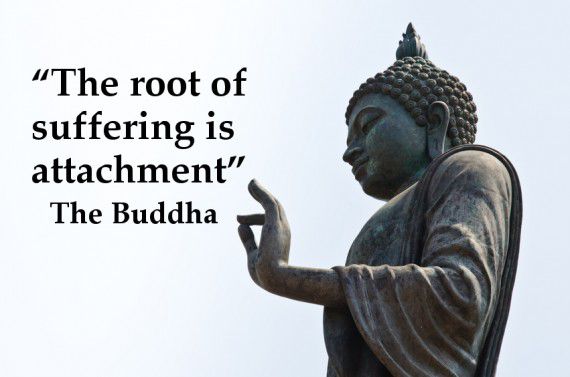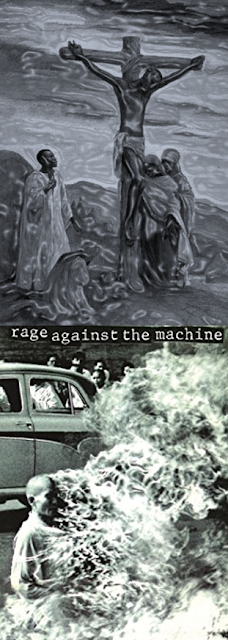Non-Clinging, Politics, & Jesus
There is a Buddhist teaching I am thinking about a lot these days. It is called anupadana. It means non-clinging, or non-attachment. It is based on the idea that clinging or grasping onto things or ideas, holding on to them too tightly, is an obstacle to being all we can be. Upadana, clinging or grasping onto things or ideas, prevents us from individually and collectively applying the truth of love in our lives.
Buddhism lays out four forms of clinging or grasping, four kinds of unhealthy attachments.
There is senses-based attachment. Renowned Buddhist teacher Buddasa states, this means “clinging to attractive and desirable sense objects.” Our six senses – seeing, hearing, smelling, tasting, touching, and thinking – attach onto what is pleasurable. We want to see beautiful things, we want to hear beautiful sounds, we want to smell fragrant things, we want to taste delicious food, we want to touch pleasant things, we want to think good thoughts. At a certain level, these desires cannot be avoided especially for laypersons. But when these desires become ingrained and habitual and harmful, so much so that we desire nothing else but the good things we want and become averse to all else, then we have deep suffering and others around us experience it too.
The other form of unhealthy attachment is an unhealthy attachment to self. Now, I talked about this a few weeks ago, and this Buddhist view is complex. But basically, an unhealthy attachment to self means being focused on my self solely, seeing that self is disconnected and separate from other selves and not effected or influenced by other selves. One current presidential candidate is a perfect example of what the Buddha meant here.
The last two examples of unhealthy attachment are the two I want to focus a little more on as we ponder this crazy political season in our country. I think the two examples of unhealthy attachment have clear examples in our political and cultural discourse. They show the nature of unhealthiness in our clinging and grasping and unhealthily attaching ourselves to things and views.
So the first of these two unhealthy attachments is the attachment to rites and customs. Buddhasa again states, “This refers to clinging to meaningless traditional practices that have been thoughtlessly handed down, practices which people choose to regard as sacred and not to be changed under any circumstances.” Now, clinging to rites and customs doesn’t happen just with old traditions and customs. Grasping onto new practices that play more on emotion, onto ways of doing things just because it is easy and it is what we’ve always done or now
do
in certain situations, this can be unhealthy.
There are a couple examples of this in our current political carnival ride. First, I think of the over reliance on the protest march as the go-to form of resistance to things we don’t like. It seems to me this is a newer example of clinging to rites and customs. Now, this is not to say protest marches don’t work. They certainly were effective during the Civil Rights Movement. And when they are large enough, they can visually represent to the country and the world just how big the problem is. I engaged in a few protest marches myself, namely against the Iraq War when a seminary student in New York City. However, I would dare say the protest march is an example of a custom that is almost cliché because it is often all that is done.
To me, the most effective way we can confront issues like gun violence and police/community conflict is to get the two sides in the same room, engage in an extended time of silent prayer and meditation, and then have a facilitated, heart to heart discussion.
Another example of clinging on to rites and customs is the rituals and traditions that surround political conventions and speeches and races. We hear the same old trite and cliché phrases and images. We experience the same old propping up of the same old tropes and oversimplifications. The same old revered sacred cows that are off-limits for discussing honestly. The lack of gray, the lack of nuance, the abundance of clichés and trite words, the lack of being real in speaking of these things is an example, I think, of unhealthy attachment to customs and rites.
Thankfully, we see in many young people a healthy questioning of, a healthy resistance to this clinging on to tradition and customs. Yes, sometimes this makes us uncomfortable. And sometimes, the manner the questioning and resistance takes is not always wise or exhibit long-term thinking. But young people do often teach us that we need to be mindful of how we older generations talk about things and how we ignore things, and that we do it often unconsciously. They help us to break our unhealthy attachment to meaningless traditions and customs and language.
The last example of unhealthy clinging onto things and ideas is to me an even larger issue. And that is the unhealthy clinging to ideas and views.
Ideological rigidity. Absolutism. These two things get at what the Buddha meant.
When we pose a litmus test that decides who is in and who is out, without any knowledge of a person or their background or their story, but with a lot of preconceptions and grudges – this is harmful. When we declare unless you agree with me 100% of the time, unless you meet my definition of who a progressive or a conservative is, you are off my list – that is harmful. When we declare that this is the way it needs to be no matter that others think differently and no matter it is a democracy where others get to disagree – that is harmful.
This is this the stuff of absolutism. Religions are not the only entities prone to absolutist thinking. Political parties, figures and supporters are also prone to absolutist thinking. We are seeing the result of it in our government as we speak. We cannot let it become the norm in us. We cannot let our differences, even our theological and political differences, become an obstacle in building the beloved community.
A few weeks ago I mentioned that indeed Jesus was an extremist. Indeed he was an absolutist. But he was an extremist, an absolutist for the only absolutism allowable – the absolutism of absolute love. Here is the paradox though, the absolutism of love is one where no one is turned away, where the last are first, the least the most cherished, the lost found and lifted up. The absolutism of love is one where the image of God we all share is what we look for first and seek to see into fruition. The absolutism of love rules out any ideological idolatry, any extremist hate, any hateful demagoguery either religious or political.
But love is a practice. It is not preaching. It is not prophesying. It is not politicking. Love means practicing. What I mean by practice is spiritual practice. It is a spiritual practice that helps us overcome unhealthy attachments and clinging to things and ideas and helps us live free and unhindered. Jesus offers us a powerful example.
Jesus shows us what living a life of non-attachment means. In a perfect example of non-attachment in just three words, Jesus said, “Love your enemies.” What’s more, he did just that despite the horrific violence against him. What enabled this?
All through the gospels, we see Jesus getting away from all the madness and the chaos to silently sit with his loving Father. We saw a pretty typical example of this in our reading today. Jesus does the Work, being heart and hand of God here and now, but knows that breaking away from the barrage of stimuli and stress. He shut off the noise and the negativity by finding a quiet place and sitting with God.
Boy, do we need to follow Jesus’ example even more these days.
Jesus also prayed with his fellow Jews in synagogues and silently walked and dined and sat quietly with his disciples. I should say here, that, no we don’t see in the gospels any specific mention of Jesus sitting intentionally silently with his disciples. The gospels are about Jesus’ actions and teaching. But no doubt Jesus and his disciples, like with any group of friends that journey together and share a lot of time together, I am sure there were times they just sat together or walked or ate together and soaked in the calm and peace of no-words and silent camaraderie. The weariness of sojourning and travel by itself surely would lead them to simply stop and rest in the quietude of God for a little bit. That is what in essence the practice of mindfulness is – stopping and resting in the quietude of God. It is as natural of dropping down after a long day and just vegging for a little bit.
The practice of silently sitting with God, not just individually, but as a community, a common unity, sitting silently with a God who is love and breathing the breath of compassion– we need this too in these troubling days.
Call it prayer or mindfulness, meditation or contemplation, the point is sitting silently, with God, listening to the still small voice of the Spirit within. We need it individually, yes. But we need it even more communally. It is what church needs to begin being centrally about. It is what people need to join to create and continue in. The Beloved Community finds continuity, renewal in those quiet moments of sitting together and seeking God’s face together.
That is why we are here. Let us follow Jesus’ model. Let us practice non-attachment by finding a quiet place and practicing quiet and let us do the same together, basing the Beloved Community in the calm and simplicity of Divine Love. From this a Compassion will exude and transforming hearts one breath at a time.



Comments
Post a Comment